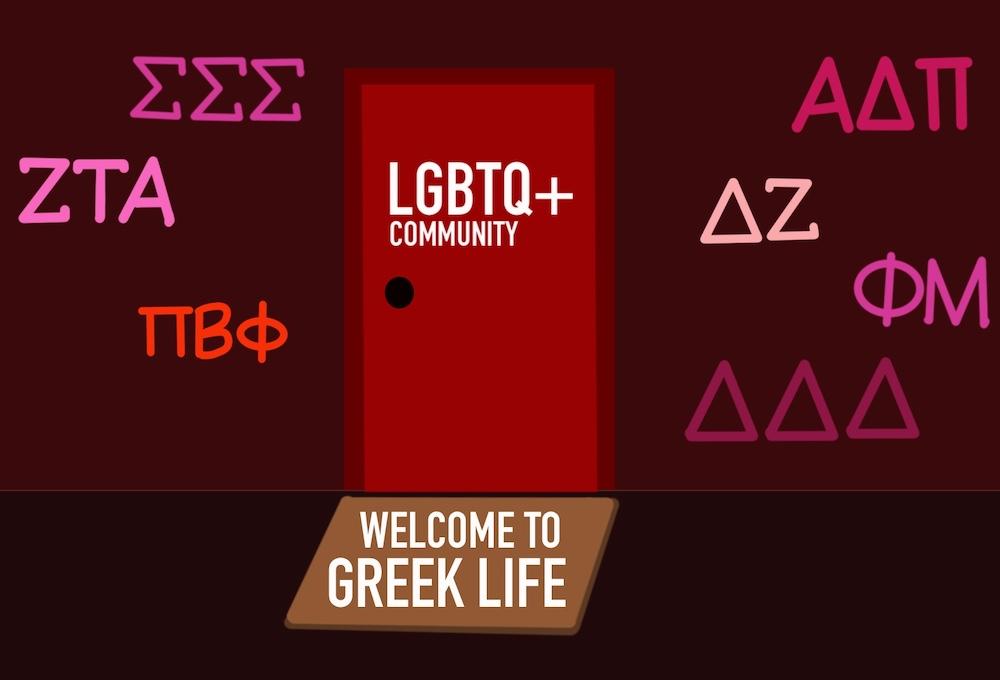Sophia Garcia, also known as Aria Garcia, is a freshman journalist at MU. They are an opinion columnist who writes about Greek Life, LGBTQ+ and diversity observations for The Maneater.
When thinking of a sorority girl, what traits do you think of? Is it a beach blonde with a golden spray tan? Or that brunette with perfect wavy hair who works out every day?
Do you ever think about the people who are the complete opposite of that? No? Well believe it or not, there are students like that, and one of them is me.
Stating the obvious, for one thing, I am not white. Fortunately for me I’ve been blessed by my natural light brown skin since my ethnicity is Filipino. My physical appearance alone is something people are taken aback with, not realizing that not everyone is white.
Another trait: I’m not a girl nor a boy; I’m non-binary, and students often forget my pronouns when I tell them. Sometimes students wonder why I would even want to go into Greek Life and if they are accepting. (Disclaimer: they are). And what’s more hilarious is the fact that what I wear throws people off. It’s almost like everyone has collectively agreed that all stereotypes about sororities are true.
Since I’m non-binary, I’m not comfortable always wearing yoga pants with a sweatshirt, skirts with a sweater or even a dress. Granted I do wear them if needed or if I feel like it, but 90% of the time students will see me wearing a flannel with brown pants, joggers with a sweatshirt or long shorts with a graphic tee.
Although people outside of sororities stereotype people like me, my sorority, Sigma Sigma Sigma, does the opposite. I remember that when getting to know the older members, they welcomed me with open arms and didn’t see pronouns as a “burden.” This doesn’t mean the rest of the sororities did that when recruiting; Panhellenic Association decided to have members’ pronouns in their name tags while recruiting.
Now, I’m already a non-binary Filipino, so that’s what separates me from the rest, right? Technically yes, but also there’s the factor that I’m pansexual. That being said, fraternity men are usually the people who are the most surprised by this. This doesn’t mean all fraternity men are, but the majority of them think I’m flirting with them when in reality I’m just a nice person. It must be the Pisces Rising in me, but that’s besides the point.
Thankfully, in Greek Life there are people who have similar situations as me — one of them is [junior] Kathleen Brenneke. They’re not only non-binary, but also a panromantic demisexual. She’s a sophomore in Tri Sigma who tries to make sure everyone feels comfortable, even if you’re a new member.
From their own experiences, she talks about how their first interaction with a member was very welcoming, but also a little unexpected.
“[Senior] Megan Boyd messages me privately on Zoom, and she goes, ‘I like your [pansexual] flag :),’ and that was the first interaction I had with Megan Boyd,” Brenneke said.
Even as a senior, Boyd tries to make sure new members feel safe within the community.
“From then on, I was a lot more open with [being pansexual] at the house and stuff, because I was like, ‘Oh, well, I know that I at least have an ally in this,’” Brenneke said.
It’s always nice to have someone like Boyd as an ally and be part of a community most people might not understand. And while this might be most of Greek Life, the committee does find a way to ensure that members feel more included. Mac McMullan, a senior in Kappa Alpha Theta, leads Greek Allies, a group that plans events for people to feel welcomed.
“I wanted to get involved in Greek Life and learn more about the LGBTQ+ community, so Greek Allies was the first place I looked,” McMullan said. “In Greek Allies, I felt safe and accepted,” McMullan said.
There are many stereotypes when it comes down to being in a sorority, but if you don’t meet those requirements, it doesn’t mean you aren’t welcome. This shouldn’t discourage students from joining a sorority. If anything, it should encourage them to take the leap and make the change MU needs in its Greek Life. Sure, it can be hard at times, especially when most don’t get it, but you’ll always find some gems that will truly understand.
This donation link promotes defending against anti-LGBTQ attacks and equality bills. The organization also helps train Missourians if someone in the LGPBTQ equality is being threatened. https://promoonline.org/campaigns/donate-to-promo/
Edited by Sarah Rubinstein, [email protected]














